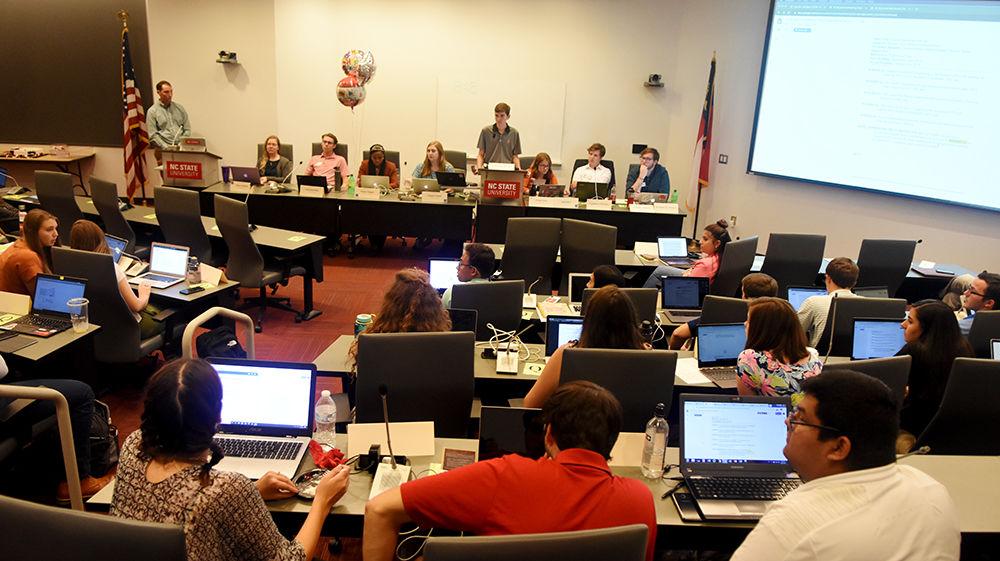During Student Senate’s Oct. 16 meeting, the body elected to remove two senators over absences and debated Board of Elections voting software access and procedure with Student Government’s fee review process.
Kelsey Horn, a second-year graduate student in public history, was appointed to an empty seat in the Graduate and Lifelong Education delegation.
GB 53 – The Special Review Membership Amendment Act – Passed in Consent Agenda
This is a minor adjustment to the Student Body Statues altering membership for the Special Review Committee. This committee oversees actions by the Board of Elections.
The chair of the Senate’s Committee for Onboarding and Leadership Development is a member of this special committee, and in instances they are not able to serve, the vice chair of the same committee will serve in their place in the future.
The bill was placed on the senate’s consent agenda, meaning it required five or more Senators to block its passage. No senators opposed GB 53, so it passed.
SR 51 – Caccavaro Expulsion Act – Unanimously Passed
College of Natural Resources Sen. Jake Caccavaro*, a fourth-year studying sports management, has accumulated 15 absences in the current Student Government session. Because no documentation has been provided, nor did Caccavaro come to any attendance hearings, the senator has been expelled from Senate.
SR 52 – Burger Expulsion Act – Unanimously Passed
Similarly, College of Engineering Sen. Max Burger, a second-year studying chemical engineering, has accumulated 11 absences in the current session. As documentation was not provided and the senator did not attend any hearings, Burger has been expelled from Senate.
GB 55 – The Freer and Fairer Student Elections Act – Unanimously Passed
This bill is a follow-up to legislation passed in the prior session, GB 73 – The Free and Fair Student Elections Act. Both bills address the fact that the Board of Election does not have access to viewing live voting totals during elections. Prior to spring 2018, the Board of Elections chair had access to such totals, and this legislation argues that preventing the board from having full access infringes on Student Government’s autonomy.
Graduate and Lifelong Education Sen. Coleman Simpson, a first-year graduate student in agricultural leadership, said the legislation addresses a consistent challenge to Student Government’s ability to self-govern.
“I think this is another line in the sand we need to draw, because it is relevant for us to be self-autonomous,” Simpson said. “We have our own mechanisms for addressing issues on behalf of student leaders, and I think making sure that the board has access is one of our key things.”
The legislation was passed along to Student Body President Emma Carter, a fourth-year in international studies and sociology, for her signature or veto.
GB 56 – The Voter Turnout Access Act – Unanimously Passed
This bill is a companion to the previous GB 55, further outlining reasoning for giving the Board of Elections access to software. It would also empower “the Board of Elections to administer the election through their own paper or electronic ballots” if software access is not provided.
Elections are currently administered through NC State’s GetInvolved website, which is run by Student Involvement. As a result, the Board of Elections’ access to the software is contingent on Student Involvement’s cooperation.
The legislation was passed along to Carter for her signature or veto.
GB 66 – Student Fees Proposal Timeline Act – Moved Back to Committee
Prompted by delayed fee proposals submitted by the university this year, this legislation changes the Student Body Statutes to oppose any fee increases submitted past a deadline by default. The bill argues that Senate requires adequate time to review fee proposals. Any changes would have to be submitted before Senate’s deadline for submission of legislation.
Graduate Student Association President James Withrow, a Ph.D. student in biology and entomology and Graduate and Lifelong Education senator, spoke about concerns faced with this year’s timeline.
“The timeline for student fees this year was rather brief,” Withrow said. “We didn’t actually get the fee proposal packet until after the legislation had come for first reading. This comes after years, in my experience, of requesting that we be involved sooner in the process.”
Ultimately, senators agreed this legislation needed further work and voted to move it back to committee for further development.
GB 64 – Yearbook Sustainability Act – Unanimously Passed after Debate
In the interest of sustainability and access, this bill aims to create a digital copy of the Student Government yearbook. This book is published as a physical copy and includes various Student Government documents, including considered legislation.
Senators proposed an amendment to the legislation, essentially future-proofing the decision by adding generic language in case the university moves away from using certain online services, namely Google Drive. The amendment was approved.
The legislation was passed along to Carter for her signature or veto.
*Jake Caccavaro is a member of Technician’s editorial board.








